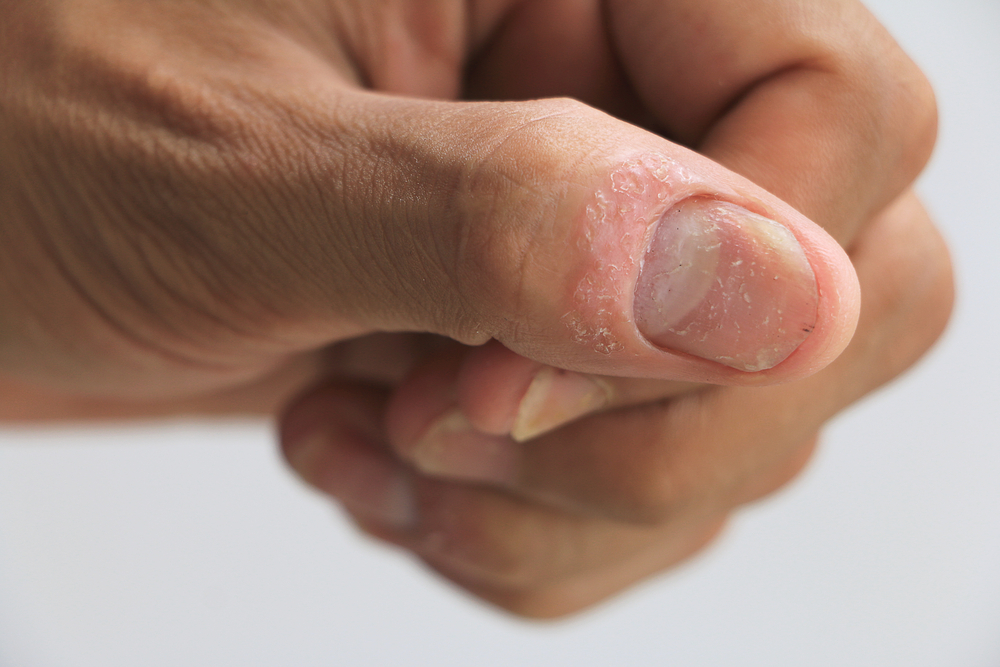Ayurvedic Treatment For Nail Psoriasis
What is Nail Psoriasis?

Nail psoriasis is a condition that affects the nails, commonly seen in individuals with psoriasis. It occurs when the immune system mistakenly targets the nail matrix, leading to various changes in the nails’ appearance and texture. Nail psoriasis can cause several symptoms, including pitting (small depressions or dents), ridges, crumbling or thickening of the nails, develop pinprick holes and change color or shape, yellowish discoloration, separation of the nail from the nail bed (onycholysis), and even complete loss of the nail. It can significantly impact the aesthetics and functionality of the nails.
When it comes to nail psoriasis treatment in Mumbai, it’s important to note that it can be challenging to treat and requires a comprehensive approach. Some ayurvedic treatment for nail psoriasis in Mumbai include topical treatments such as corticosteroids or calcipotriol, which can be applied directly to the nails. Additionally, targeted phototherapy or intralesional injections may be used for localized treatment. It’s crucial to consult with a dermatologist to determine the most suitable ayurvedic treatment for nail psoriasis based on the severity of the condition. They can provide personalized recommendations and guidance on the best treatment for nail psoriasis.
Symptoms of Nail Psoriasis
You’ll know you’re getting nail psoriasis when you see these changes in your fingernails or toenails:
- Color. Your nails may turn white, yellow, or brown. They may also have small red or white spots underneath.
- Debris buildup. Chalky white material can gather under your nail, causing it to lift away from the skin. This can be painful.
- Thickening. About a third of people with nail psoriasis can also get a fungal infection that can cause your nails to get thick. Separation. Your nail may loosen or separate from the nail bed.
It is important to consult with a best skin ayurvedic doctor or dermatologist to determine the most suitable plan for nail psoriasis cure based on individual needs. They can provide expert guidance on nail psoriasis treatment in ayurveda, taking into account the severity of the condition and an individual’s specific circumstances.
Causes of Nail Psoriasis
Nail psoriasis is an immune system problem. Typically, new skin cells grow every 28 to 30 days. However, in people with psoriasis, new cells grow and move to the skin surface every three to four days, which creates a skin rash. In some people with psoriasis, it affects their nails in addition to their skin or other parts of their bodies.
Risk of Nail Psoriasis
Nail psoriasis is a type of psoriasis that affects the nails, causing them to become thick, discolored, and sometimes brittle. Nail psoriasis can be painful and affect the overall quality of life.
Here are some of the risks associated with nail psoriasis:
Joint damage: Nail psoriasis can sometimes be a sign of psoriatic arthritis, which is a type of arthritis that affects people with psoriasis. If left untreated, psoriatic arthritis can lead to joint damage, so it is important to seek medical attention if you have nail psoriasis and joint pain or swelling.
Emotional impact: Nail psoriasis can affect the appearance of the nails, which can be embarrassing and impact self-esteem. This can lead to anxiety, depression, and other emotional problems.
Difficulty performing daily activities: Nail psoriasis can make it difficult to perform daily activities that require the use of hands, such as typing, opening jars, and buttoning clothing.
Fungal infections: Nail psoriasis can increase the risk of developing a fungal infection in the nails. This is because the thickened nails can create an environment that is hospitable to fungal growth.
Treatment complications: Treating nail psoriasis can be challenging, and some treatments can have side effects or complications. For example, some medications used to treat nail psoriasis can affect liver function or increase the risk of infections.
Ayurvedic Treatment for Nail Psoriasis
Nail psoriasis can cause discomfort, affect the appearance and functionality of the nails, and may be associated with psoriatic arthritis. Consultation with a healthcare professional is important for accurate diagnosis and proper management to minimize symptoms and improve well-being.
Nail psoriasis itself does not spread from one nail to another or from person to person. However, it can affect multiple nails simultaneously or progress over time to involve additional nails. The spread of nail psoriasis within an individual's nails is a result of the underlying autoimmune condition and its impact on the nail matrix. Proper management and treatment can help control the spread and minimize the involvement of additional nails.
Nail psoriasis develops as a result of an underlying autoimmune condition called psoriasis. It causes changes in the nails, such as pitting, discoloration, and thickening. The immune system attacks the healthy cells in the nail matrix, leading to these changes. The exact cause is not fully understood, but genetics and environmental factors play a role. Consulting with a healthcare professional is important for accurate diagnosis and management.
To prevent worsening of nail psoriasis, avoid picking or biting the affected nails, using harsh chemicals or nail products, wearing tight-fitting shoes or gloves, self-diagnosing or self-treating, and subjecting nails to excessive trauma. Consulting a healthcare professional is important for proper care and management.
The healing time for nail psoriasis varies and can take several months to see improvement, as it is a chronic condition. Ongoing management and care are necessary, and working with a healthcare professional is important for personalized nail psoriasis treatment and guidance.
Nail psoriasis is a chronic condition that currently has no known cure. However, various treatment options can effectively manage and control the symptoms of nail psoriasis, providing relief and improving the appearance and function of the nails. With proper care, lifestyle modifications, and nail psoriasis treatment, many individuals with nail psoriasis can achieve significant improvement and long-term control of their symptoms.





